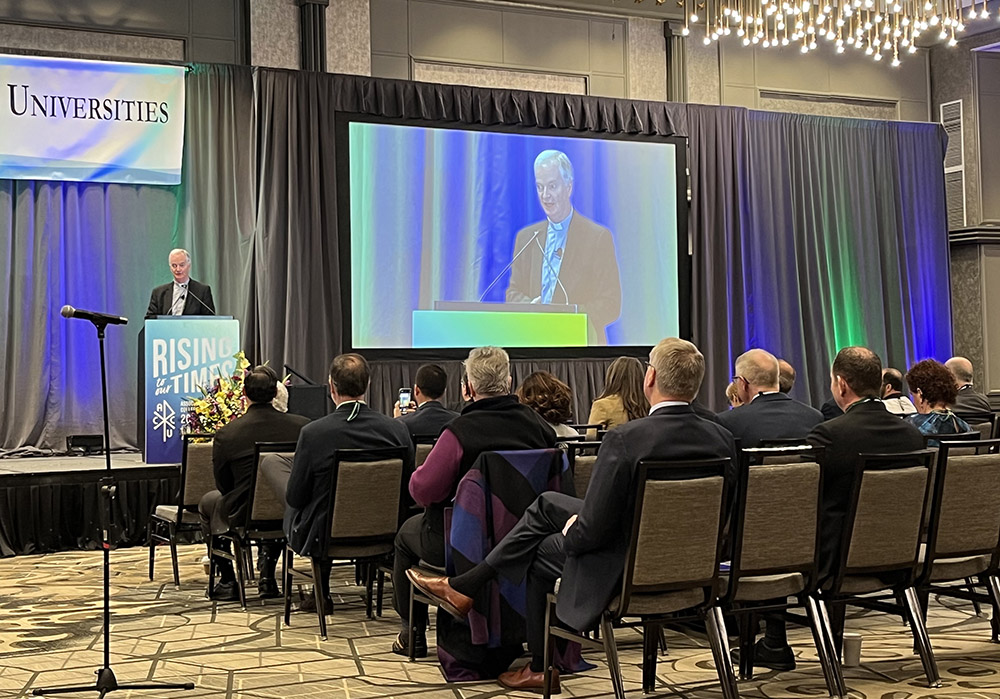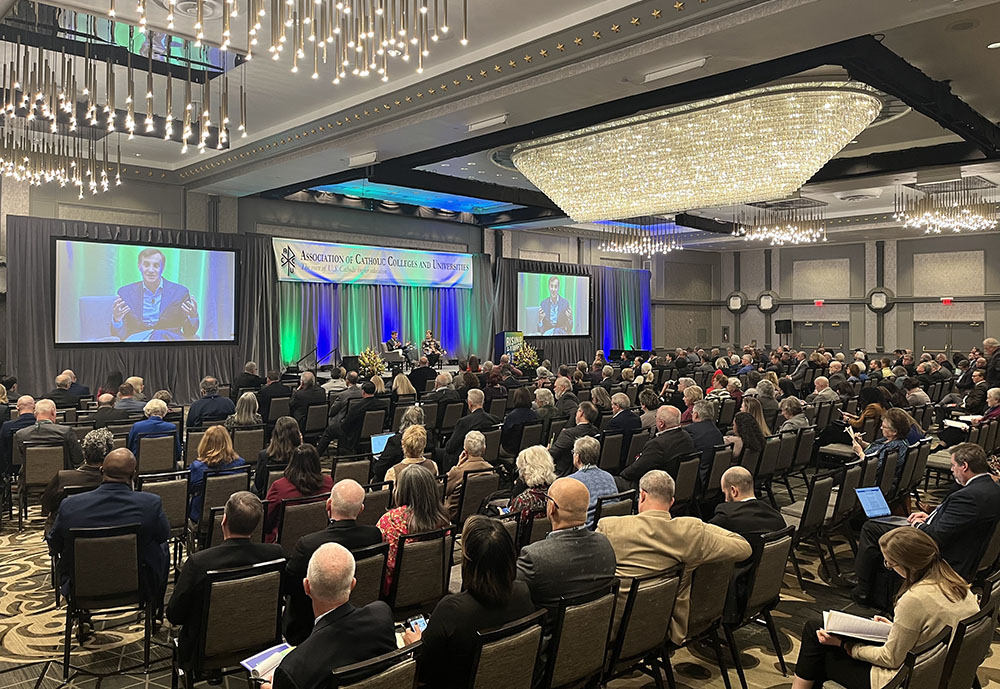
Bishop Paul Tighe, a secretary at the Vatican's Dicastery for Culture and Education, speaks to the meeting of the Association of Catholic Colleges and Universities in Washington on Feb. 6. (NCR photo/Joshua J. McElwee)
A top official at the new Vatican office tasked with overseeing Catholic educational institutions around the world praised the efforts of U.S. Catholic colleges and universities on Feb. 6, telling a national assembly of higher education leaders that the Vatican values their work and expertise.
Bishop Paul Tighe, a secretary at the Dicastery for Culture and Education, reassured the hundreds of American Catholic college leaders attending an annual gathering of the Association of Catholic Colleges and Universities that his office sees itself primarily as a "catalyst" for conversations, and not as a doctrinal supervisor.
"You are the experts in education," Tighe told the college presidents, board members and mission officers attending the Feb. 3-6 meeting. "We want to respect that. We want to encourage you to deal with the day-to-day life and challenges of your institutions."
Tighe, who leads the culture wing of the new Vatican office, also suggested the U.S. higher education officials consider their institutions a "hugely privileged place" for encounters between the Catholic Church and wider American culture.
For many young people, the faculty and staff at their Catholic college "become the face of the church," said the bishop. "Equally, each new generation of students is coming in from a different culture, is coming in with different sets of values ... and you're in a sense at the cutting edge of that encounter between faith and culture, between their belief systems and our belief systems."
"What we want to do is encourage you to live that, to continue do it, to thank you for what you're doing, but also to maybe make it a more explicit part when you think about your mission, about your purpose," said Tighe.

Johns Hopkins University President Ronald Daniels speaks to the meeting of the Association of Catholic Colleges and Universities in Washington on Feb. 5. (NCR photo/Joshua J. McElwee)
The Association of Catholic Colleges and Universities is a membership group that includes some 225 institutions of higher learning across the U.S., Canada and in several other countries. Its 2023 meeting, held at a hotel in downtown Washington, focused on the theme "Rising to Our Times."
Among the various panel discussions were conversations about faculty pay, racial justice, campus climate goals and the needs of LGBTQ students. The latter panel, held on Feb. 5, focused especially on how campuses interact with students who identify as trans or in a way other than the gender they were assigned at birth.
At that panel, three college presidents spoke about how their individual institutions were working with gender nonconforming students. Although the conversation was held under the "Chatham House Rule" — meaning attendees agreed they would not reveal afterward who had made any particular comment, with hopes of fostering discussion — each college president generally emphasized a desire for dialogue and discussion on their campuses.
"We all enter into this dialogue from varying perspectives," said one of the presidents. That person recalled conversations they have had with their college's board of directors about how the institution should work with trans students.
The president said it was particularly helpful to host a training at which board members were able to hear directly from trans students about their experiences.
"That was transformational for our community," said the president.
Advertisement
In questions after his plenary talk, Tighe was also asked to give a perspective about how Catholic colleges should work with LGBTQ students.
"One thing I think we need to recover is the intrinsic dignity, value and worth of every single human person," the bishop said, sparking wide applause in the meeting room. "Whatever we say and however we need to say it, we need to have a prudence that somehow we're not excluding anyone from a sense of being embraced by God's love."
Tighe, originally from Ireland, has been in Vatican service in various roles since 2007. His current dicastery was created by Pope Francis in June 2022 as part of the wider reform of the Vatican bureaucracy, and resulted from the merger of the former Pontifical Council for Culture and the former Congregation for Catholic Education.
Other plenary speakers at the Feb. 3-6 gathering included economist Jeffrey Sachs; theologian M. Therese Lysaught; Johns Hopkins University President Ronald Daniels; and Richard Haass, president of the Council on Foreign Relations. Also addressing the assembly was Nasser Paydar, an assistant secretary at the U.S. Department of Education.
Daniels and Haass focused their remarks, given Feb. 5, on how Catholic colleges might help strengthen U.S. democracy. Daniels, author of the 2021 volume What Universities Owe Democracy, said American institutions of higher education "must do more to ensure that our students are coming into contact ... with the history and function of democracy."
The Johns Hopkins president said Catholic institutions "have a special role to play" in educating students in the habits and values of democracy. He called Catholic colleges "keepers of the civic flame."







